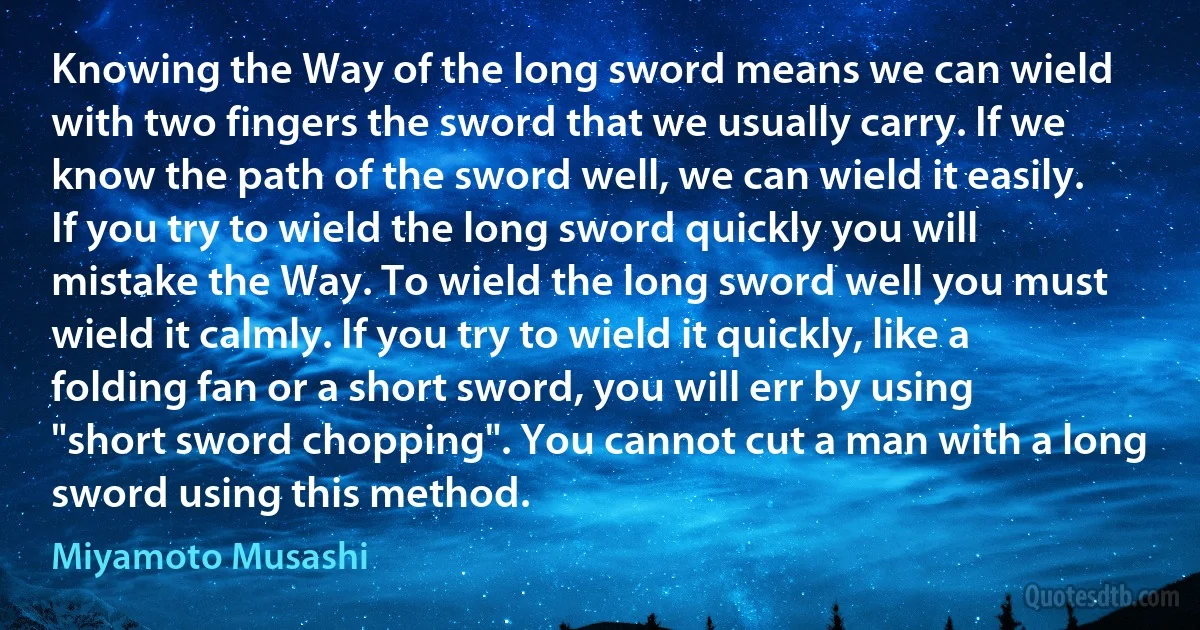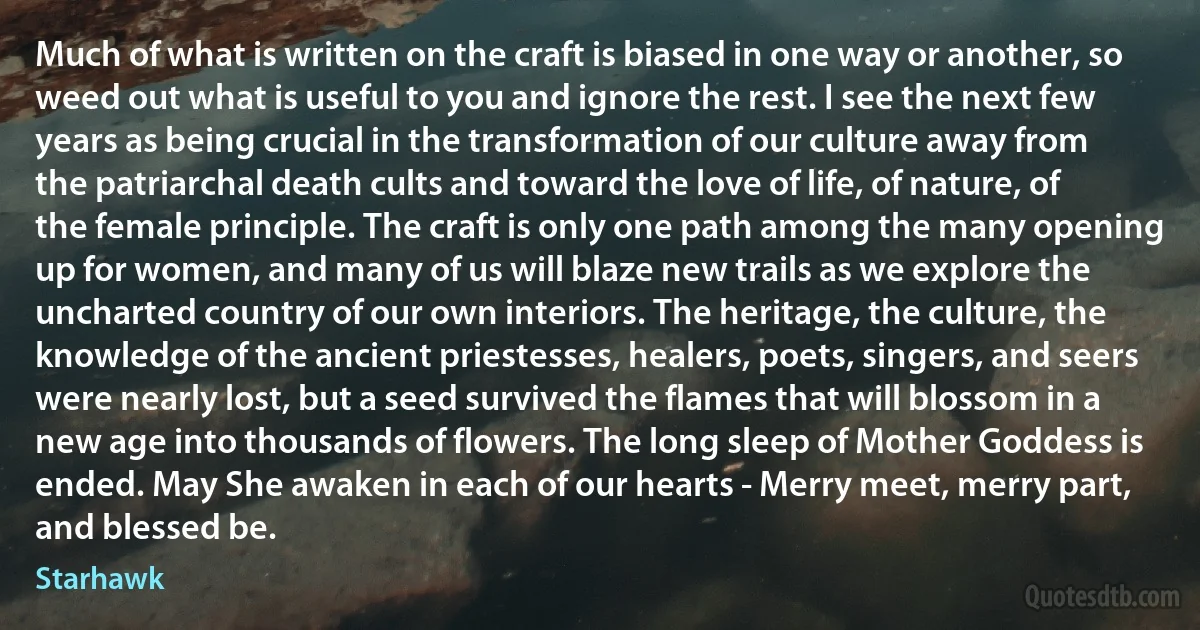Path Quotes - page 81
It is difficult for these people to cut the enemy when at close quarters because of the length of the long sword. The blade path is large so the long sword is an encumbrance, and they are at a disadvantage compared to the man armed with a short companion sword.
From olden times it has been said: "Great and small go together." So do not unconditionally dislike extra-long swords. What I dislike is the inclination towards the long sword. If we consider large-scale strategy, we can think of large forces in terms of long swords, and small forces as short swords. Cannot few men give battle against many? There are many instances of few men overcoming many.

Miyamoto Musashi
The tables of criminality for different ages, given in my published treatise, merit at least as much faith as the tables of mortality, and verify themselves within perhaps even narrower limits; so that crime pursues its path with even more constancy than death. ...it is still betwixt the ages of twenty-one and twenty-five, that, all things being equal, the greatest number of persons are to be found in that position [of a criminal].

Adolphe Quetelet
A free culture has been our past, but it will only be our future if we change the path we are on right now. Like Stallman's arguments for free software, an argument for free culture stumbles on a confusion that is hard to avoid, and even harder to understand. A free culture is not a culture without property; it is not a culture in which artists don't get paid. A culture without property, or in which creators can't get paid, is anarchy, not freedom. Anarchy is not what I advance here. Instead, the free culture that I defend in this book is a balance between anarchy and control. A free culture, like a free market, is filled with property. It is filled with rules of property and contract that get enforced by the state. But just as a free market is perverted if its property becomes feudal, so too can a free culture be queered by extremism in the property rights that define it. That is what I fear about our culture today. It is against that extremism that this book is written.

Lawrence Lessig
But, at the same time, in spite of all the inegalitarianism and injustice which permeates the laws and the stories which illustrate the application of these laws, there is a thread of basic humanitarianism which runs through the gamut of Indian civilisation, which makes India appropriately qualified to show the path to the rest of the world at this crucial juncture in human history - not on the basis of Hindu precedents, but on the basis of this basic humanitarianism developed to its full potential.

Shrikant Talageri
...That [speech] was a huge moment in my life that I will never, ever regret, and that I have never regretted, no matter how embarrassed I might have been by it at a certain point. I knew it was one of those moments where you have to be a really good parent to yourself and go: "This is a time you can get out there and just say it, you have to because if you don't do it now you set a precedent for yourself at these things. You shut up your entire life at school, you took all this shit and you were quiet, look how it made you feel. You're at this thing right now, this magnified high school class and now you got a chance to go up and say something? Don't be shy. No matter how it comes out, just let it come out.” So I'm really glad that I did that and I think that that set me on a good path.

Fiona Apple
As we walk hand in hand through the pathways of knowledge, remember that I am giving you freely and without stint the full accumulation of my two months' experience as a candidate. I have on file a complete record of everything I've said and done. Ever since I threw my hat in the ring I have had myself shadowed, and the results were very entertaining. The things that go on in those back rooms, you wouldn't believe.
So now we begin our journey together. If you follow these instructions carefully, you will find that every step of your progress, like the path that climbs up and up from the sheltered valley, offers you an ever-wider and more facinating vista, until at last you come out upon the summit of the wrong hill.

Gracie Allen
We would have every arbitrary barrier thrown down. We would have every path laid open to Woman as freely as to Man. Were this done, and a slight temporary fermentation allowed to subside, we should see crystallizations more pure and of more various beauty. We believe the divine energy would pervade nature to a degree unknown in the history of former ages, and that no discordant collision, but a ravishing harmony of the spheres, would ensue.
Yet, then and only then will mankind be ripe for this, when inward and outward freedom for Woman as much as for Man shall be acknowledged as a right, not yielded as a concession.

Margaret Fuller
As Voltaire once remarked, "It is the privilege of the real genius, especially one who opens up a new path, to make great mistakes with impunity." The Copernican revolution brought about by Kant was, I think, the most important single turning point in the history of philosophy. For that reason there has been, ever since, a watershed in understanding between those who have taken his work on board and those who have not. For a good many of the problems he uncovered, the solutions he put forward have not stood the test of time, but his uncovering of the problems remains the most illuminating thing a philosopher has ever done. Because of the fundamental character of these problems, and because Kant did not solve them, confronting them has been the most important challenge to philosophy ever since.

Bryan Magee
I do not consider myself less ignorant than most people. I have been and still am a seeker, but I have ceased to question stars and books; I have begun to listen to the teachings my blood whispers to me. My story is not a pleasant one; it is neither sweet nor harmonious, as invented stories are; it has the taste of nonsense and chaos, of madness and dreams - like the lives of all men who stop deceiving themselves.
Each man's life represents the road toward himself, and attempt at such a road, the intimation of a path. No man has ever been entirely and completely himself. Yet each one strives to become that - one in an awkward, the other in a more intelligent way, each as best he can.

Hermann Hesse
Now they had to study just as stringently and methodically as the engineers and technicians of the past, if not more so. They had a steep path to climb, had to purify and strengthen their minds by dint of mathematics and scholastic exercises in Aristotelian philosophy. Moreover, they had to learn to renounce all those benefits which previous generations of scholars had considered worth striving for: rapid and easy money-making, celebrity and public honors, the homage of the newspapers, marriages with daughters of bankers and industrialists, a pampered and luxurious style of life.

Hermann Hesse
There is a great distinction between the terms "aspirant to the Path" and "applicant for initiation". He who aspires and strives towards discipleship is in no way pledged to the same specific attitude and discipline as is the applicant for initiation, and he can, if he so choose, take as long as he desires in the treading of the Probationary Path.

Alice Bailey
I hope all who read this book will receive the inspiration that we who have prepared it have received; I hope also that their confidence in the Hierarchy and in the existence of Christ and His Disciples, the Masters, may receive such an impetus that many more will attempt to tread the Way and join the great number of aspirants in every country who are seeking to tread the Path by becoming the Path Itself.

Alice Bailey
Only the man whose sense of identity is beginning to expand and become inclusive, can "take initiation" (as it is erroneously termed). If initiation were a purely personal achievement, it would throw the man back into the separative consciousness, out of which he is endeavouring to escape. This would not be spiritual progression. Every step upon the Path of Initiation increases group recognition.

Alice Bailey
We can come through this trying time stronger, and with a renewed sense of purpose and respect for one another. The pandemic has shown us that it is not only our troops who are willing to offer the ultimate sacrifice for the safety of the community. Americans in hospitals, grocery stores, post offices, and elsewhere have put their lives on the line in order to serve their fellow citizens and their country. We know that we are better than the abuse of executive authority that we witnessed in Lafayette Square. We must reject and hold accountable those in office who would make a mockery of our Constitution. At the same time, we must remember Lincoln's "better angels," and listen to them, as we work to unite.
Only by adopting a new path - which means, in truth, returning to the original path of our founding ideals - will we again be a country admired and respected at home and abroad.

James Mattis
I read, among many others... Sri Ramana Maharshi..., whose Path of Self-knowledge I sought to follow. Through his meditation on "Who am I?", I found myself precipitated into a sense of identity with the whole phenomenal world: the earth, the sky, the houses and people; the trees and birds and clouds, I saw to be myself. I disappeared as a separate being, yet retained full consciousness, a consciousness expanded to include everything. I saw that this was the true Reality, that one's normal waking consciousness simply covers this, keeps it hidden, through wrong identification with oneself as this body. I also saw this phenomenal world as a kind of ritual, a ritualised shadow-play, acting out a dream or desire of That which alone existed, alone was Real, which was also myself.

Ramana Maharshi
It has been observed that missiles and projectiles describe a curved path of some sort; however no one has pointed out the fact that this path is a parabola. But this and other facts, not few in number or less worth knowing, I have succeeded in proving; and what I consider more important, there have been opened up to this vast and most excellent science, of which my work is merely the beginning, ways and means by which other minds more acute than mine will explore its remote corners.

Galileo Galilei
Now it is up to all of us, all the participants in the European process, to make the best possible use of the groundwork laid down through our common efforts. Our idea of a common European home serves the same purpose too. It was born out of our realization of new realities, of our realization of the fact that the linear continuation of the path, along which inter-European relations have developed until the last quarter of the twentieth century, is no longer consonant with these realities. The idea is linked with our domestic economic and political perestroika which called for new relations above all in that part of the world to which we, the Soviet Union, belong, and with which we have been tied most closely over the centuries.

Mikhail Gorbachev



